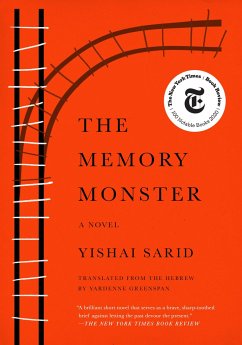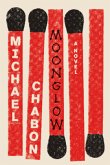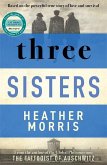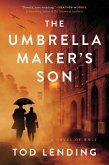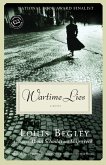"A brilliant short novel that serves as a brave, sharp-toothed brief against letting the past devour the present" (The New York Times Book Review Editors' Choice), Yishai Sarid's The Memory Monster is a harrowing parable of a young historian who becomes consumed by the memory of the Holocaust.
A NEW YORK TIMES BOOK REVIEW 100 NOTABLE BOOKS OF 2020 SELECTION
Written as a report to the chairman of Yad Vashem, Israel's memorial to the victims of the Holocaust, our unnamed narrator recounts his own undoing. Hired as a promising young historian, he soon becomes a leading expert on Nazi methods of extermination at concentration camps in Poland during World War II and guides tours through the sites for students and visiting dignitaries. He hungrily devours every detail of life and death in the camps and takes pride in being able to recreate for his audience the excruciating last moments of the victims' lives.
The job becomes a mission, and then an obsession. Spending so much time immersed in death, his connections with the living begin to deteriorate. He resents the students lost in their iPhones, singing sentimental songs, not expressing sufficient outrage at the genocide committed by the Nazis. In fact, he even begins to detect, in the students as well as himself, a hint of admiration for the murderers-their efficiency, audacity, and determination. Force is the only way to resist force, he comes to think, and one must be prepared to kill.
With the perspicuity of Kafka's The Trial and the obsessions of Delillo's White Noise, The Memory Monster confronts difficult questions that are all too relevant to Israel and the world today: How do we process human brutality? What makes us choose sides in conflict? And how do we honor the memory of horror without becoming consumed by it?
A NEW YORK TIMES BOOK REVIEW 100 NOTABLE BOOKS OF 2020 SELECTION
Written as a report to the chairman of Yad Vashem, Israel's memorial to the victims of the Holocaust, our unnamed narrator recounts his own undoing. Hired as a promising young historian, he soon becomes a leading expert on Nazi methods of extermination at concentration camps in Poland during World War II and guides tours through the sites for students and visiting dignitaries. He hungrily devours every detail of life and death in the camps and takes pride in being able to recreate for his audience the excruciating last moments of the victims' lives.
The job becomes a mission, and then an obsession. Spending so much time immersed in death, his connections with the living begin to deteriorate. He resents the students lost in their iPhones, singing sentimental songs, not expressing sufficient outrage at the genocide committed by the Nazis. In fact, he even begins to detect, in the students as well as himself, a hint of admiration for the murderers-their efficiency, audacity, and determination. Force is the only way to resist force, he comes to think, and one must be prepared to kill.
With the perspicuity of Kafka's The Trial and the obsessions of Delillo's White Noise, The Memory Monster confronts difficult questions that are all too relevant to Israel and the world today: How do we process human brutality? What makes us choose sides in conflict? And how do we honor the memory of horror without becoming consumed by it?
Praise for The Memory Monster:
"A brilliant short novel that serves as a brave, sharp-toothed brief against letting the past devour the present.... Other writers have described well the reverberations of trauma (like David Grossman in See Under: Love) but few have taken this further step, to wonder out loud about the ways the Holocaust may have warped the collective conscience of a nation, making every moment existential, a constant panic not to become victims again."
-Gal Beckerman, The New York Times Book Review, Editors' Choice
"Award-winning Israeli novelist Sarid's latest work is a slim but powerful novel, rendered beautifully in English by translator Greenspan.... Propelled by the narrator's distinctive voice, the novel is an original variation on one of the most essential themes of post-Holocaust literature: While countless writers have asked the question of where, or if, humanity can be found within the profoundly inhumane, Sarid incisively shows how preoccupation and obsession with the inhumane can take a toll on one's own humanity.... it is, if not an indictment of Holocaust memorialization, a nuanced and trenchant consideration of its layered politics. Ultimately, Sarid both refuses to apologize for Jewish rage and condemns the nefarious forms it sometimes takes. A bold, masterful exploration of the banality of evil and the nature of revenge, controversial no matter how it is read."
-Kirkus Reviews, Starred Review
"A brilliant, challenging, and uncompromising novel.... It lays bare the hard truth, often obscured by a too-hopeful vision of humanity, that Holocaust education has not led to a softer, kinder world, and 'Never Again' merely means 'never again for us.'"
-Mitchell Abidor, Jewish Currents
"Award-winning Yishai Sarid's slender, elegantly translated novel grapples with some mighty questions, among them the myriad ways in which the Holocaust might be seen to have shaped Israel's culture, and the complex existential politics of memorialisation and Holocaust education.... Where the book excels is in its readiness to court controversy without surrendering nuance, and in place of moralising it offers questioning that's as necessary as it is unsettling."
-Hephzibah Anderson, The Guardian
"The Memory Monster is one of the great Israeli novels to have been published in translation in recent years. Sarid's book is wonderfully subversive, darkly humorous; riveting, challenging, and thought-provoking. The voice-captured well in English by Yardenne Greenspan-is finely balanced, teetering on the edge as the memory monster sinks its teeth deeper and deeper into Sarid's protagonist. The Memory Monster is a novel that demands to be read and deserves our attention."
-Liam Hoare, Fathom
"[A] record of a breakdown, an impassioned consideration of memory and its risks, and a critique of Israel's use of the Holocaust to shape national identity.... Sarid's unrelenting examination of how narratives of the Holocaust are shaped makes for much more than the average confessional tale."
-Publishers Weekly
"Sarid's incisive critique of Holocaust memorialization, the corruption within it, and the perverse forms of nationalism it can engender is courageous.... It unabashedly critiques the link between Holocaust remembrance culture and the tendency of certain strains of Jewish and particularly Israeli culture to overrate the centrality of aggressive survivorship to Jewish identity, and how this culture in turn nurtures the militarization, settler colonialism, and Islamophobia that combine to create the perfect storm of violent right-wing nationalism.... Nuanced and subtle at every level."
-Miranda Cooper, Los Angeles Review of Books
"The Memory Monster is shattering, brilliant, disturbing, and very important. Sarid's background as a lawyer makes the narrator's arguments-and his falling apart-all the more disturbing when his logic fails. How can the horrors of the Holocaust be taught, remembered? A powerful novel."
-Lynne Tillman, author of Men and Apparitions
"The short but powerful novel raises the question of how far we let the horrors of the past infiltrate our present-day lives.... The Memory Monster is not an easy book to read but its message is important to hear."
-Ellis Shuman, The Times of Israel
"Numerous powerful passages evoke [the narrator's] increasingly vivid interior experiences of what happened at the camps.... The book feels like real life in its humble details, but even more so in its implied conclusion that no ultimate actions, no final solutions, are ever truly available to us.... It makes a valuable contribution to the present generation of Holocaust literature. It adds to the hope that the memory of the monster may linger unto the nth generation."
-Jon Sobel, Blogcritics
"A brilliant short novel that serves as a brave, sharp-toothed brief against letting the past devour the present.... Other writers have described well the reverberations of trauma (like David Grossman in See Under: Love) but few have taken this further step, to wonder out loud about the ways the Holocaust may have warped the collective conscience of a nation, making every moment existential, a constant panic not to become victims again."
-Gal Beckerman, The New York Times Book Review, Editors' Choice
"Award-winning Israeli novelist Sarid's latest work is a slim but powerful novel, rendered beautifully in English by translator Greenspan.... Propelled by the narrator's distinctive voice, the novel is an original variation on one of the most essential themes of post-Holocaust literature: While countless writers have asked the question of where, or if, humanity can be found within the profoundly inhumane, Sarid incisively shows how preoccupation and obsession with the inhumane can take a toll on one's own humanity.... it is, if not an indictment of Holocaust memorialization, a nuanced and trenchant consideration of its layered politics. Ultimately, Sarid both refuses to apologize for Jewish rage and condemns the nefarious forms it sometimes takes. A bold, masterful exploration of the banality of evil and the nature of revenge, controversial no matter how it is read."
-Kirkus Reviews, Starred Review
"A brilliant, challenging, and uncompromising novel.... It lays bare the hard truth, often obscured by a too-hopeful vision of humanity, that Holocaust education has not led to a softer, kinder world, and 'Never Again' merely means 'never again for us.'"
-Mitchell Abidor, Jewish Currents
"Award-winning Yishai Sarid's slender, elegantly translated novel grapples with some mighty questions, among them the myriad ways in which the Holocaust might be seen to have shaped Israel's culture, and the complex existential politics of memorialisation and Holocaust education.... Where the book excels is in its readiness to court controversy without surrendering nuance, and in place of moralising it offers questioning that's as necessary as it is unsettling."
-Hephzibah Anderson, The Guardian
"The Memory Monster is one of the great Israeli novels to have been published in translation in recent years. Sarid's book is wonderfully subversive, darkly humorous; riveting, challenging, and thought-provoking. The voice-captured well in English by Yardenne Greenspan-is finely balanced, teetering on the edge as the memory monster sinks its teeth deeper and deeper into Sarid's protagonist. The Memory Monster is a novel that demands to be read and deserves our attention."
-Liam Hoare, Fathom
"[A] record of a breakdown, an impassioned consideration of memory and its risks, and a critique of Israel's use of the Holocaust to shape national identity.... Sarid's unrelenting examination of how narratives of the Holocaust are shaped makes for much more than the average confessional tale."
-Publishers Weekly
"Sarid's incisive critique of Holocaust memorialization, the corruption within it, and the perverse forms of nationalism it can engender is courageous.... It unabashedly critiques the link between Holocaust remembrance culture and the tendency of certain strains of Jewish and particularly Israeli culture to overrate the centrality of aggressive survivorship to Jewish identity, and how this culture in turn nurtures the militarization, settler colonialism, and Islamophobia that combine to create the perfect storm of violent right-wing nationalism.... Nuanced and subtle at every level."
-Miranda Cooper, Los Angeles Review of Books
"The Memory Monster is shattering, brilliant, disturbing, and very important. Sarid's background as a lawyer makes the narrator's arguments-and his falling apart-all the more disturbing when his logic fails. How can the horrors of the Holocaust be taught, remembered? A powerful novel."
-Lynne Tillman, author of Men and Apparitions
"The short but powerful novel raises the question of how far we let the horrors of the past infiltrate our present-day lives.... The Memory Monster is not an easy book to read but its message is important to hear."
-Ellis Shuman, The Times of Israel
"Numerous powerful passages evoke [the narrator's] increasingly vivid interior experiences of what happened at the camps.... The book feels like real life in its humble details, but even more so in its implied conclusion that no ultimate actions, no final solutions, are ever truly available to us.... It makes a valuable contribution to the present generation of Holocaust literature. It adds to the hope that the memory of the monster may linger unto the nth generation."
-Jon Sobel, Blogcritics

